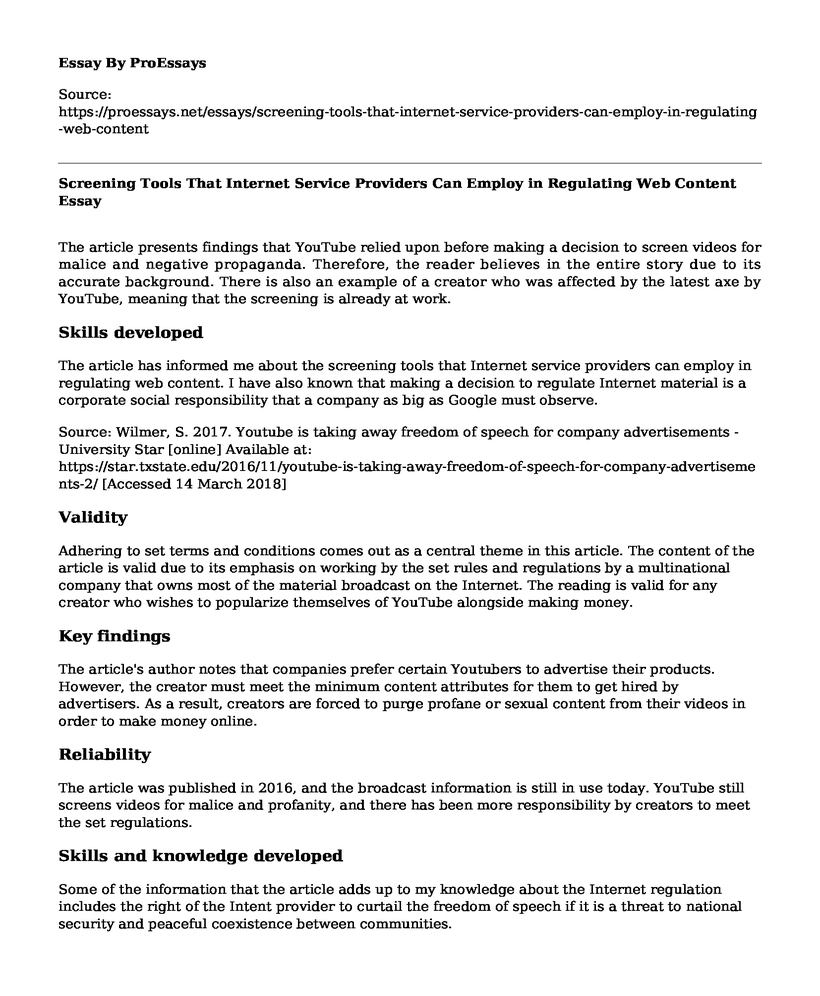Skills developed
The article has informed me about the screening tools that Internet service providers can employ in regulating web content. I have also known that making a decision to regulate Internet material is a corporate social responsibility that a company as big as Google must observe.
Source: Wilmer, S. 2017. Youtube is taking away freedom of speech for company advertisements - University Star [online] Available at: https://star.txstate.edu/2016/11/youtube-is-taking-away-freedom-of-speech-for-company-advertisements-2/ [Accessed 14 March 2018]
Validity
Adhering to set terms and conditions comes out as a central theme in this article. The content of the article is valid due to its emphasis on working by the set rules and regulations by a multinational company that owns most of the material broadcast on the Internet. The reading is valid for any creator who wishes to popularize themselves of YouTube alongside making money.
Key findings
The article's author notes that companies prefer certain Youtubers to advertise their products. However, the creator must meet the minimum content attributes for them to get hired by advertisers. As a result, creators are forced to purge profane or sexual content from their videos in order to make money online.
Reliability
The article was published in 2016, and the broadcast information is still in use today. YouTube still screens videos for malice and profanity, and there has been more responsibility by creators to meet the set regulations.
Skills and knowledge developed
Some of the information that the article adds up to my knowledge about the Internet regulation includes the right of the Intent provider to curtail the freedom of speech if it is a threat to national security and peaceful coexistence between communities.
Source: Allton, M. How to ban trolls and bots from your Facebook page - The Social Media Hat [online] Available at: https://www.thesocialmediahat.com/article/how-ban-trolls-and-bots-your-facebook-pageValidity
The article is valid because it explores a common nuisance among Facebook users. Often, people get annoyed by countless "spammy" comments that flood their wall a few seconds after they update their status. The article takes users through a step-by-step process of eradicating this nuisance.
Key findings
Many Facebook users have cried foul over the comments on their posts that are not relevant to their topics. The author of this article samples several responses from users who have been victims of this unwanted automation. The author notes that they support automation, although they are also against automation that is "spammy" and irrelevant.
Reliability
This source cannot be doubted. It is the work of a renowned tech blogger in a popular website. Although the article is not dated, the issues that it raises are incessant problems that Facebook users come across on a daily basis
Knowledge and skills developed
I have learnt that marketers automate comments to popularize their products. I have also known that the spammers hope that Facebook users would become their fans once they find numerous comments by the marketers. I am also conversant with the process of removing bots and avoiding spamming message that appear on my Facebook account
Cite this page
Screening Tools That Internet Service Providers Can Employ in Regulating Web Content. (2022, Apr 04). Retrieved from https://proessays.net/essays/screening-tools-that-internet-service-providers-can-employ-in-regulating-web-content
If you are the original author of this essay and no longer wish to have it published on the ProEssays website, please click below to request its removal:
- Art Essay: Caravaggio's Last Two Paintings
- The Growth of Social Media Essay
- Paper Example on Object-Oriented Paradigm
- Film Analysis Essay on His Girl Friday (1940)
- Essay Example on Social Media and TV: How They Impact Criminal Justice in the Digital Era
- Essay on Lin-Manuel Miranda: Broadway's Supreme Leader & His Historic Musical 'Hamilton'
- Literature Review on Smart Devices and the Internet of Things







